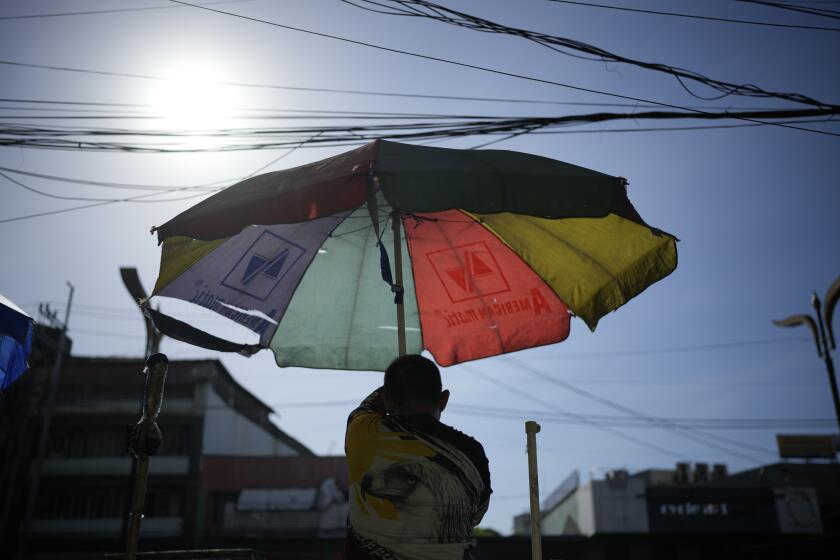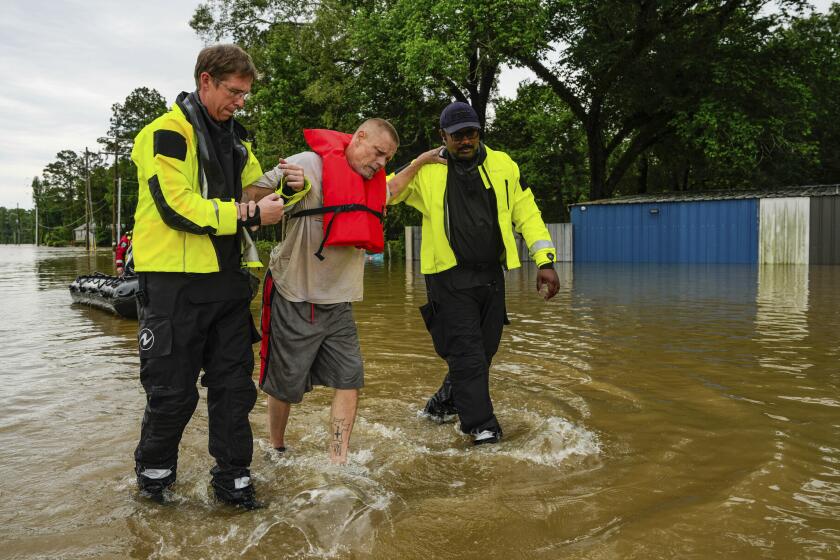Albanians Protest for 4th Day Over Serbian Pressure
Thousands of ethnic Albanians, awakened by continuing Serbian pressure for increased control over the autonomous province of Kosovo, took to the streets in protest Monday for the fourth straight day.
Undeterred by drizzling rain, the Albanians marched twice on Communist Party headquarters here in the province’s capital and rallied in a soccer stadium, demanding the reinstatement of two Albanian leaders forced to resign under Serbian nationalist pressure.
Police did nothing to stop the marches, even though the Serbian nationalist leader, Slobodan Milosevic, accused the demonstration’s organizers of “genocide and terror” and demanded that they be jailed.
The rising Albanian backlash to the Serbian nationalist movement is a potentially explosive ingredient in Yugoslav politics, recalling a previous Albanian outburst in 1981, in which nine persons were killed in ethnic rioting and hundreds of Albanian youths were jailed.
Campaigning for Changes
Milosevic and his supporters have been mounting large demonstrations for much of the last year, campaigning for changes in the 1974 Yugoslav constitution, which officially made two regions of Serbia--Kosovo and Vojvodina--into “autonomous provinces,” within Serbia. The Serbs of Kosovo charge that they are brutally repressed by the ethnic Albanians--who are a majority in the region--and they want greater Serbian control over the province.
The 1974 constitution, designed by Josip Broz Tito, the Yugoslav leader who died in 1980, was engineered in part to ease fears of Serbian dominance in the Yugoslav federal balance, which includes six republics as well as the two autonomous regions.
In October, Milosevic took his fight to the national Communist Party and received at least a temporary setback when the central leadership closed ranks against him.
After regrouping his forces, however, Milosevic has continued to press for the installation of his own handpicked leaders in Kosovo, and on Thursday succeeded in forcing the resignations of Azem Vlasi, the Albanian Politburo member in Kosovo, and Kacusa Jasari, the Kosovo Communist Party leader.
The resignations inspired the first large demonstrations here since 1981 and have confounded even the Kosovo Communist Party leaders, who seem unsure how to respond to the increasing flood of protests in the streets of this city of about 100,000, the capital of the poorest region of Yugoslavia, where unemployment is running at 50%.
The provincial party’s Central Committee is planning a meeting for later this week, but no one here Monday could predict what the party leaders will do next.
Various regional and national authorities have appealed for calm. Some have called for an end to the demonstrations, but the protests--which have included large numbers of students who attend the university here--seem unlikely to stop without some assurance that Serbian pressure on the Albanian population will end.
Serbs, who now make up less than 10% of the Kosovo population, have charged for years that their cemeteries and monuments are vandalized, that Serbian schoolgirls are raped by gangs of Albanians and that Albanians are bent on seceding from Yugoslavia to become a part of neighboring Albania. “Genocide” is routinely mentioned here.
The issue is further emotionally charged because most Serbs regard Kosovo as the center of their historic national culture.
The Albanians, in taking to the streets, have repeatedly chanted “Yugoslavia” and “Tito” as a demonstration, they say, that they are for a united Yugoslavia and favor the constitutional changes brought about by the Yugoslav leader who allowed the Albanian language and culture to be taught in schools here.
Serbian Hysteria Claimed
The emotional accusations against them, they say, are the result of Serbian hysteria and nationalism.
They say they have no interest in seceding from Yugoslavia and that what they want is development for their economically backward regions and to be left in peace by the Serbs.
Milosevic has said he wants to install his own Albanian ally, Husamedin Azemi, as the party chief in Kosovo. Azemi, Milosevic believes, would be acceptable to the Serbs here, but he is unpopular among the Albanians, who see him as a Serbian puppet.
The rallies and marches along the central streets of Pristina went on well into the night Monday, with thousands of students making up the main body of the demonstrators.
More to Read
Start your day right
Sign up for Essential California for news, features and recommendations from the L.A. Times and beyond in your inbox six days a week.
You may occasionally receive promotional content from the Los Angeles Times.






